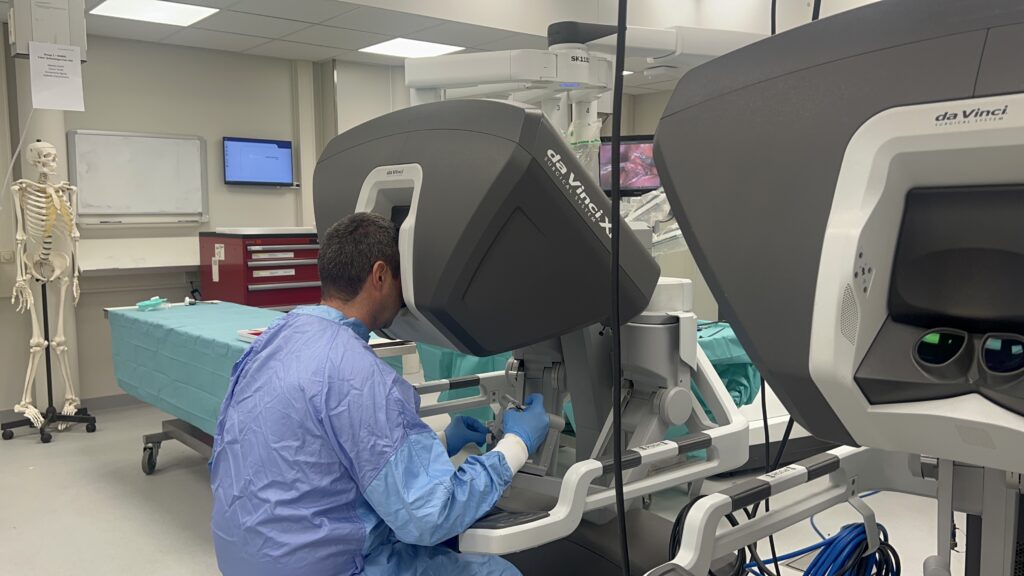
Upper GI Cancer Training Pathway
{acf_news_topic}
The ESSO Training Pathway in Upper GI Cancer Surgery offers a focused curriculum on the multidisciplinary and surgical management of oesophageal and gastric cancers.
What's included
In addition to the mandatory and optional courses, the pathway includes a short observership and culminates with the awarding of an ESSO Certificate of Competence, with the option to take the recommended EBSQ examination. Designed to recognise your expertise and commitment to evidence-based upper GI cancer surgery, it’s the ultimate step toward excellence in surgical oncology.
Related courses
MDT Management of Patients with Upper GI Malignancies
Level 1
Mandatory
Annual
Online
This online course offers an in-depth exploration of the preoperative, operative, and postoperative management of patients with upper GI cancers. Organised yearly and led by expert faculty, it covers essential preoperative planning, including staging and patient selection, followed by detailed discussions on surgical approaches for oesophageal and gastric cancers. The course also addresses enhanced recovery after surgery (ERAS), postoperative care, quality of life considerations, and outcome optimisation. Through focused lectures and interactive case discussions, participants will gain practical insights to enhance outcomes across the patient care pathway.
Course on Minimally Invasive Esophagectomy and Gastrectomy
Level 2
Mandatory
Annual
In person
Led by an international faculty of experts, this annual course introduces robot-assisted minimally invasive gastrectomy and esophagectomy. Through focused lectures, participants will explore the techniques’ potential, limitations, and practical implementation. Cadaver-based hands-on sessions using both conventional and robotic systems will complement anatomical and surgical training, offering a comprehensive learning experience in minimally invasive upper GI surgery.
Course on Abdominal Surgery – Surgical Technique
Level 1
Optional
Annual
In person
Organised every year, this hands-on workshop focuses on the surgical anatomy of abdominal organs and vessels, integrating practical dissection with interactive discussions on management challenges. Using specially embalmed bodies, participants will apply oncological surgical techniques, learning key pearls and pitfalls for each organ. The course includes video sessions, plenary lectures, and a pre-course 3D surgical anatomy atlas to enhance anatomical knowledge and surgical skills. Objectives cover cardiovascular access to abdominal organs and advanced oncologic surgical techniques.
Artificial Intelligence in Healthcare
Level 1
Optional
Annual
In person
Artificial Intelligence (AI) is transforming healthcare, offering tools that enhance both clinical efficiency and patient care. In this hands-on workshop which is organised once per year, interested surgeons and radiologists will explore how AI works, learn to train models for real-world applications, and apply their medical expertise to develop practical solutions using clinical data, images, and reports.
This workshop offers a hands-on introduction to AI in medicine, covering model types, tasks, real-world use cases, and the role of clinical expertise. Participants will use Python tools to work with public datasets, analyse medical images, and create 3D organ models for surgical planning. The course includes plenary lectures and practical exercises.
Fluorescence-Guided Surgery
Level 1
Optional
Biennial
In person
Organised every 2 years, this course offers essential and advanced insights into fluorescence-guided surgery. It is focusing on tumour and lymphatic imaging, sentinel lymph node detection, visualization of vital structures (bile ducts, ureters, nerves), and tissue perfusion assessment. Participants will explore both standard and targeted imaging agents (e.g., antibody-, peptide-, nanobody-based) and gain practical experience in open, laparoscopic, and robotic settings.
Hands-on sessions using different fluorophores and imaging systems are complemented by plenary lectures on key topics, including lymphatic and tumour imaging, perfusion assessment, and intraoperative navigation of vital structures.
Related webinars
To complement your knowledge gained through the Training Pathway courses, ESSO recommends following optional webinars covering both specialty-specific and transversal topics. These webinars provide in-depth insights, may include interactive case discussions, and are designed to enhance clinical understanding and support continuous professional development.
Short-term observerships
To enhance their training, candidates in the Upper GI Cancer Training Pathway are invited to independently arrange a short-term observership at an ESSO-approved unit for training. Lasting 1 to 3 months, this self-organised observership can include access to operating theatres, outpatient consultations, MDT meetings, and research activities. Direct clinical involvement is not anticipated.
EBSQ examination recommendation
Each year, the European Union of Medical Specialists (UEMS) organises the European Board of Surgery Qualification (EBSQ) Examination in Surgical Oncology. As part of the ESSO Upper GI Training Pathway, candidates are invited to take the exam organised by the European Board of Surgery, Division of Surgical Oncology of the UEMS to complete their Training Pathway.
ESSO certificate
The ESSO Certificate of Competence is awarded upon successful completion of the full Training Pathway, including all mandatory courses, a short-term observership, and the EBSQ Examination. It recognises a surgeon’s advanced knowledge and skills in evidence-based surgical oncology within their chosen specialty.